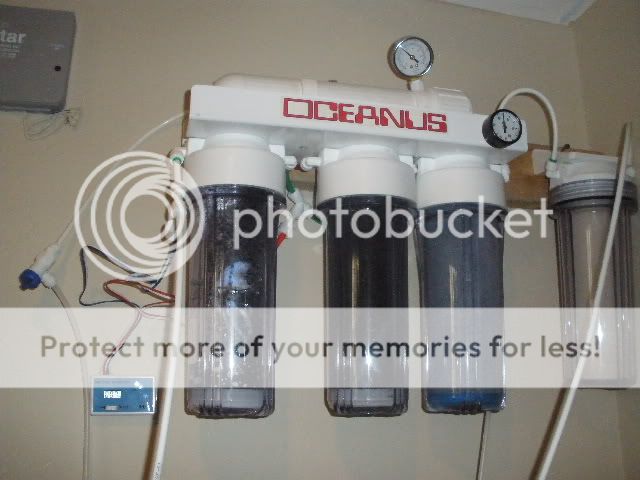nkd5024
Fish Fanatic
I REALLY need a new RO unit.
I am looking at the Captive Purity Deluxe 35 GPD 4-stage RO/DI.
I read a really good review on the brand in an advanced aquarist article.
I have heard that you should install small ball value on each of the output to keep the RO membrane wet, is this true?
My main concern is that, I just read RO membranes are destroyed by chlorine.
I don't actually understand how chlorine would destroy the membrane so if anyone knows, let me know.
It said that a carbon pre-filter would get rid of the chlorine and prevent it from destroying my RO membrane.
Will the Carbon Block pre-filter that comes with most RO/DI units remove ALL of the chlorine and chloramine?
Does anyone here use chlorinated tap water with their RO unit?
Also, is it necessary to have an in-line pressure gauge?
I would be replacing the Carbon and Sediment pre-filters for every 1,000 gallons produced as recommended by LiveAquaria.
Are there any other uses for a pressure gauge other than to tell when the pre-filters are getting clogged or to make sure you have enough pressure from your faucet?
I just brought my old RO unit up to my apartment, which has city tap water with chlorine/chloramine. It has always been at my parents house which has well water, so I don't know much about the whole chlorine thing.
Thanks you for you time,
Nick D.
I am looking at the Captive Purity Deluxe 35 GPD 4-stage RO/DI.
I read a really good review on the brand in an advanced aquarist article.
I have heard that you should install small ball value on each of the output to keep the RO membrane wet, is this true?
My main concern is that, I just read RO membranes are destroyed by chlorine.
I don't actually understand how chlorine would destroy the membrane so if anyone knows, let me know.
It said that a carbon pre-filter would get rid of the chlorine and prevent it from destroying my RO membrane.
Will the Carbon Block pre-filter that comes with most RO/DI units remove ALL of the chlorine and chloramine?
Does anyone here use chlorinated tap water with their RO unit?
Also, is it necessary to have an in-line pressure gauge?
I would be replacing the Carbon and Sediment pre-filters for every 1,000 gallons produced as recommended by LiveAquaria.
Are there any other uses for a pressure gauge other than to tell when the pre-filters are getting clogged or to make sure you have enough pressure from your faucet?
I just brought my old RO unit up to my apartment, which has city tap water with chlorine/chloramine. It has always been at my parents house which has well water, so I don't know much about the whole chlorine thing.

Thanks you for you time,
Nick D.



 - what I meant about the TDS, my tapwater was in the hundreds
- what I meant about the TDS, my tapwater was in the hundreds 


